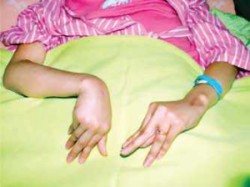 Hypocalcaemia is defined as the low levels of serum calcium in the blood. It is a type of electrolyte disturbance in the body. As long as calcium levels in the body are within the range of 2.2 mmol/ L to 2.6 mmol/ L, it is said to be normal. Conversely, when the levels are less, there is hypocalcaemia, whereas calcium levels greater than this are considered hypercalcemia.
Hypocalcaemia is defined as the low levels of serum calcium in the blood. It is a type of electrolyte disturbance in the body. As long as calcium levels in the body are within the range of 2.2 mmol/ L to 2.6 mmol/ L, it is said to be normal. Conversely, when the levels are less, there is hypocalcaemia, whereas calcium levels greater than this are considered hypercalcemia.
Calcium is one of the most common and most important minerals in the body. It is necessary to build strong bones in both men and women. It plays many vial roles in the body. Some of calcium’s bodily functions include normal cell functioning, membrane stability, intracellular signaling,building and fixing bones and teeth,assist in making the nerves work by sending messages to the nervous system, help blood clot, and regulate the heart’s rhythm, among other things.
Ninety-nine percent of calcium in the body is found in the bones. When the body has low calcium levels, the bones release calcium to bring to the blood to normalize the blood levels. This, in turn, will affect bone mass. The main source of calcium is food.
Causes of Hypocalcaemia
There are many causes of hypocalcaemia. Sometimes, it can also serve as a symptom for malfunctions of certain hormones and vitamin deficiencies in the body.
- Parathyroid hormone (PTH) deficiency
- PTH regulates serum calcium in the body
- Vitamin D deficiency
- May lead to low bone mineral density
- Abnormal levels of magnesium in the body, usually hypomagnesaemia
- Chronic renal failure
- Acute pancreatitis
- Chemotherapy complications
- Osteoporosis treatments containing bisphosphonate drugs
- Eating disorders, such as anorexia nervosa and bulimia
- Certain drugs
- Alcoholism
- Increase phosphate levels in the body
- Phosphate and calcium levels are inversely proportional to one another
Symptoms of Hypocalcaemia
Mild hypocalcaemia does not usually manifest symptoms. However, the following are symptoms to watch out for if one is suspected of hypocalcaemia:
- Neuromuscular irritability
- Twitching or spasms of nerves and muscles
- Muscular cramps in arms and legs
- Numbness and tingling of fingers and toes and around mouth and lips
- Irritability or depression
- Arrhythmias
- Convulsions
Prevention of Hypocalcaemia
It is essential to maintain normal calcium levels in the body, especially since the body loses calcium every day. There amount calcium levels in the body are dependent on certain factors: food, electrolyte balance, hormones and vitamins, therefore, hypocalcaemia can be prevented in multiple ways.
- Make sure that calcium-containing food is part of the diet. Calcium is found in many food sources:
- Dairy products
- Dark green leafy vegetables
- Fish
- Electrolyte imbalance results to increased or decreased amounts of calcium in the body, therefore alcohol intake should be moderated and eat a well-balanced diet.
- Take sufficient amounts of vitamin D to maintain appropriate vitamin D hydroxylation in the skin.
It is necessary to regulate calcium levels in the body, especially at a young age because it aids in building bone mass. Hypocalcaemia can lead to weaker bones in the body in the future, hence making people more prone to osteoporosis and bone fractures at older ages. Understanding hypocalcaemia may help in taking first aid training, especially bone-related topics.
